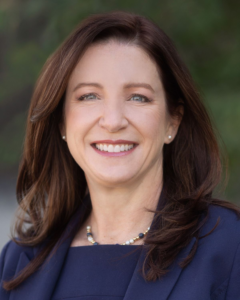
Shea Properties wants to turn the office building at 4340 S. Monaco St. in Denver into an apartment building. (Google Maps)
The ritzy municipality of Cherry Hills Village has objected to a rezoning that could put income-restricted apartments at its doorstep.
“We have very serious concerns that you’re stranding low-income families on an island between I-25, a four-lane arterial, with no access to medical care, no access to grocery stores and no access to transit,” Cherry Hills Mayor Katy Brown said at a Denver Planning Board meeting this month.
Brown also sent a six-page letter to Denver officials dated June 12 opposing the rezoning of 4340-4350 S. Monaco St., which is in Denver but across the street from Cherry Hills Village.
The property has two office buildings on it. Denver-based Shea Properties is under contract to purchase the vacant four-story office building to the north, with plans to refashion the structure into 143 apartments that would be reserved for those making an average of 60 percent of the area median income, with some residents making 30 percent. The latter figure corresponds to a max of $27,400 a year for an individual based on current figures.
The mayor of the city of 6,400 people said Shea’s proposal should be more suburban in nature, like row homes instead of an apartment complex. In her letter, Brown noted that the nearest bus stop is about three-quarters of a mile away and runs once every 30 minutes, and that the area meets USDA’s definition of a “food desert.”

Mayor Katy Brown
“All the restaurants, shops, and services are in the Belleview Station area, one mile away, and cater to a high-end market with businesses such as Ruth’s Chris Steakhouse and clothing boutiques that sell designer clothing,” Brown wrote.
The median household income in Cherry Hills Village tops $250,000, and nearly every house is owner-occupied, according to U.S. Census data.
Brown noted that the rezoning would apply to the whole parcel, even though Shea Properties is not buying the office building to the south. Brown said she was concerned that more dense housing could eventually be built there.
“Rezoning this entire 12-acre property … would actually allow the addition of hundreds of units – literally a wall of high-density housing directly across the street from very low-density single-family housing,” Brown said at the July 3 Planning Board meeting.
The Denver City Council will vote on whether to approve the rezoning on Aug. 12.
The council had been scheduled to vote June 17. But that plan was upended after Brown’s letter, and another from the mayor of nearby Greenwood Village noted that Cherry Hills had not been notified of the rezoning. She also pointed out other errors, like a report written by Denver city staff referring to the area where Cherry Hills sits as “unincorporated Arapahoe County.”
Denver’s zoning code requires that all properties within 200 feet of a proposed rezoning be notified by the city, even if the parcel falls outside Denver’s borders. In this instance, three homes in Cherry Hills should have received notices.
As a result, the June 17 council meeting saw its members kick the item back to Denver’s Planning Board to restart the rezoning process to allow for proper notification.
“There was some minor technical error in the way it (the rezoning) was noticed, and so the city said they want to go back through all of this process — which we’re doing — and Shea’s very supportive of that,” said Peter Culshaw, executive vice president of Shea Properties.
The properly-notified rezoning has since been discussed and forwarded by Denver’s Planning Board and a City Council committee. Much of the conversation in those meetings centered around the notification error, and less so on Cherry Hills Village’s objections to the merit of the rezoning.
“I think, frankly, it’s all nonsense,” Culshaw said of the objections.
His main point: You can’t change the nature of suburbia, but people have to live in it.
“There’s grocery stores a couple of miles away,” he said. “I live a couple miles away from a grocery store, I’m fine getting there. Transit … you’re a mile away from light rail. The average age of people in affordable tends to be a little younger, and they tend to be a little more active. So I think that there is access to transit. There’s a scooter system in Denver, people ride bikes. They have cars.”
“People can live closer to where they work. It’s that simple.”
